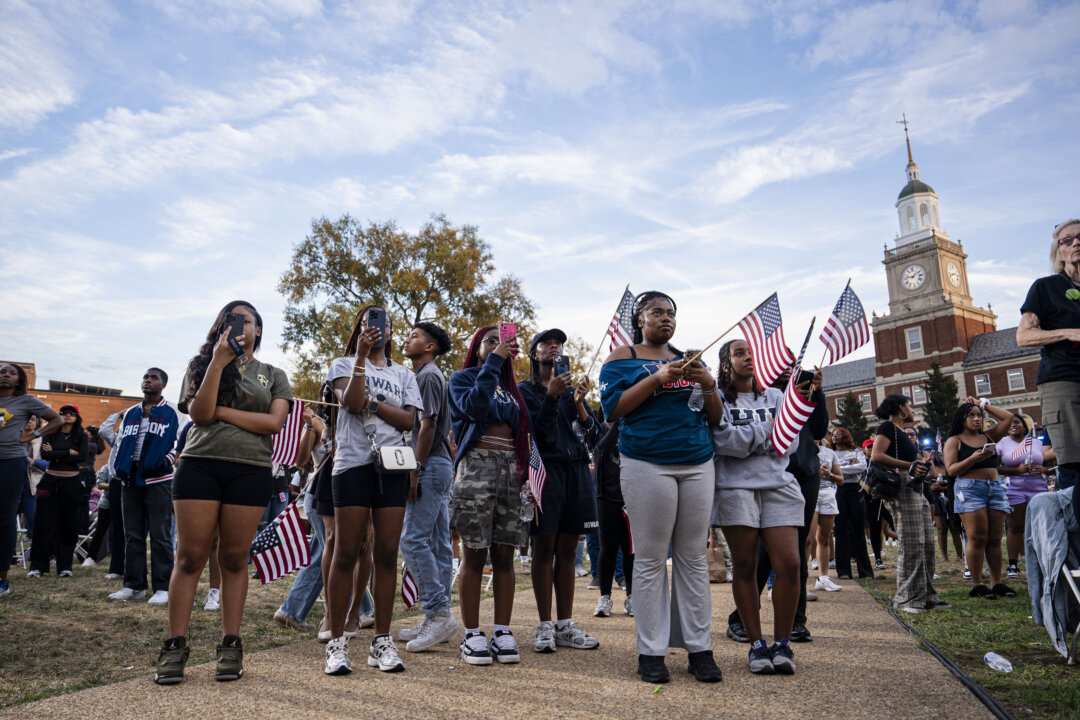The organizers pushed back against calls to blame the progressive movement for Harris’s loss to Trump.
A coalition of progressive Democrats met in a virtual call on Nov. 7 to discuss their plans of revamping the Democratic Party in the coming years after the party’s presidential election loss to former President Donald Trump.
Titled “Making Meaning of the Moment,” the virtual call invited listeners to organize community events for political action and take part in a multiyear, four-step plan to increase the Democratic Party’s broader coalition to win back Congress.
The hosts also planned to put a magnifying glass on Trump’s first 100 days in office to highlight any actions that may be unpopular with the American electorate and distributed a petition to urge President Joe Biden to use his final months in office to sign sweeping executive actions to “protect democracy.”
The organizers also acknowledged that many top lawmakers are now publicly reassessing which groups in the party should have seats at that table for defining its ethos moving forward, as well as who’s to blame for Vice President Kamala Harris’s losing at least five battleground states to Trump and likely the remaining two not yet called by The Associated Press.
It was the Democratic Party leadership defending the status quo and abandoning the working class that led to Trump’s victory, Sen. Bernie Sanders (I-Vt.) wrote in a letter posted on X on Nov. 6.
“In the coming weeks and months, those of us concerned about grassroots democracy and economic justice need to have some very serious political discussions,” Sanders wrote.
Moderate lawmakers in the party have publicly blamed the progressive factions for alienating the American electorate with fringe issues that don’t resonate amid the nation’s economic woes.
“In this election, Americans have made their voice clear: Democrats need to focus more on issues Americans care about, like wages and benefits, and less on being politically correct,” Rep. Tom Suozzi (D-N.Y.) wrote in a post on X.
He said Americans are now more afraid of “the left” than they are of “what President Trump will do” and that his party failed to respond to the GOP’s highlighting of chaos on college campuses, the support for the defund the police movement, the allowance of “biological boys in girls’ sports,” and attacks on traditional values.
“We cannot get wrapped around the axles by our base and resistance politics,” he said.
Suozzi was joined by his New York congressional delegation colleague Rep. Ritchie Torres (D-N.Y.), who also blamed the “far left” for Trump’s win in a post on X.
“Donald Trump has no greater friend than the far left, which has managed to alienate historic numbers of Latinos, blacks, Asians, and Jews from the Democratic Party with absurdities like ‘Defund the Police’ or ‘From the River to the Sea’ or ‘Latinx,’” Torres wrote.
“The working class is not buying the ivory-towered nonsense that the far left is selling.”
The organizers of the virtual call defended their coalition.
“Maybe you’re a leftist who feels deep frustration at the many calls to move the Democrats to the center at the expense of targeted and marginalized communities, the expense of suffering people and normal times,” Ash-Lee Woodard-Henderson, co-executive director of the Highlander Research & Education Center, told the attendees.
She was joined by progressive congresswoman Rep. Pramila Jayapal (D-Wa.), who dismissed calls to blame the party’s left-wing coalitions for Harris’s loss.
“The blame game, you’ve seen it, it’s already started with a lot of cheap shots at our progressive movement, and it’s easy to finger-point even for us, but we need to resist it,” Jayapal said.
“I imagine we share a lot of theories about this election and what led us here, but I think we actually need to look at the [exit polling] data.”
She said the Democratic Party was not able to “clearly articulate to enough voters“ what the party ”would do to make their lives materially better” and that it needs to decide what the party stands for moving forward.
In a September national poll from The New York Times/Siena College, nearly half of registered voters said Harris is “too liberal or progressive.”
In its October national poll, a plurality of voters—37 percent—said Harris makes the partisan divide worse in this country, although 48 percent said the same about Trump.
Looking at exit poll data, Harris lost ground with traditional Democrat voting blocks, including Hispanic men.
Trump increased his support among that group by 18 percent, and among Hispanic women by 7 percent, since 2020.
While some Democrats have publicly alleged that racism and sexism led to those groups moving away from Harris this year, Republicans argue that it is the Democratic Party’s fixation on culture-war issues, particularly transgender rights, that has alienated some Latino Americans.
Several attendees at Trump’s Latino American roundtable in Miami last month told The Epoch Times that this was one of the topics pushing their community farther to the right in recent years.
Roughly 75 percent of Latino Americans who have heard the term Latinx say it should not be used to describe the Hispanic or Latino community, according to a September poll from the Pew Research Center.
The term was spearheaded by the progressive left as a “gender neutral” alternative to Latino or Latina, which are grammatically gender based signifiers for members of the Hispanic population.

